|
Did you know your mind is constantly creating stories—narratives so vivid and detailed they feel as real as the world around you? But here’s the catch: not all of these stories are true. Some are distorted memories, others are pure imagination, and many are a mix of both. The mind is so powerful that these stories can shape how you feel, how you act, and even the reality you create. Let’s dive deeper into how this works, why it happens, and what you can do to reclaim control over your mind’s narratives. How the Mind Creates Stories Imagine this: You’re walking down the street, and you see someone you know. They don’t wave or smile back at you. Within seconds, your mind starts spinning: • “Did I upset them? Are they mad at me?” • “Maybe they don’t like me anymore…” What really happened? Maybe they didn’t see you or were distracted, but your brain filled in the gaps with assumptions and emotional stories. This happens because your mind relies on two key sources: 1. Memories: The brain doesn’t store perfect snapshots. Instead, it remembers bits and pieces of past experiences and emotions, which it reconstructs when you recall them. 2. Imagination: When details are missing, the mind fills in the blanks using your thoughts, fears, or expectations. The result? A story that feels real, even though it may not be true. The Emotional Power of Thought Have you ever woken up from a vivid dream feeling angry, sad, or even anxious? Maybe you dreamed a friend betrayed you, and for a moment, it felt so real that you couldn’t shake the emotion. That’s because your brain doesn’t differentiate between real and imagined events when it comes to emotions. When you imagine something, your amygdala (the brain’s emotion center) reacts just as it would to a real experience, producing physical sensations like a racing heart, sweaty palms, or tightness in your chest. For example: • Replaying a past failure: If you keep replaying the time you made a mistake at work, your brain relives the embarrassment, making you feel like it’s happening all over again. • Worrying about the future: Thinking, “What if I mess up my presentation tomorrow?” triggers anxiety in the present, even though the event hasn’t happened yet. Why You Can’t Always Trust Your Thoughts The stories your mind creates can be distorted in several ways: • Memory Bias: Your brain may exaggerate or alter details over time. For example, you might remember a childhood argument as worse than it actually was because your emotions magnified it. • Negativity Bias: You’re more likely to dwell on negative memories or imagined outcomes than positive ones because the brain evolved to focus on threats for survival. • Catastrophizing: Your mind jumps to the worst-case scenario, like thinking your partner didn’t text back because they’re upset with you, when in reality, they may just be busy. These distortions can lead to unnecessary stress, anxiety, and even conflicts with others. Virtualization in the Brain: How It Helps and Hurts Your brain is like a virtual reality machine. It constantly simulates past experiences, imagines future ones, and creates “what-if” scenarios. This ability to virtualize happens in areas like the prefrontal cortex (planning and imagination) and the hippocampus (memory recall). • Example of Help: Picture yourself preparing for a big presentation. You mentally rehearse what you’ll say and visualize yourself succeeding. This boosts confidence and readiness. • Example of Harm: Imagine you’re lying awake at night, replaying a potential argument with your boss. Even though it hasn’t happened, your body reacts with stress as if it’s real, robbing you of peace and sleep. The key is learning to use virtualization for growth, not unnecessary suffering. Reclaiming Control: How to Stop Believing Every Thought Here’s the truth: you are not your thoughts. Your mind is an incredible tool, but it’s also a storyteller that doesn’t always tell the truth. Here’s how to take back control: 1. Practice Mindfulness: When a thought arises, pause and observe it without judgment. For example: • “Is this thought based on fact or assumption?” • “Is this helping me or harming me right now?” Treat your thoughts like passing clouds. You don’t have to grab onto them or believe every one. 2. Use Visualization Wisely: Instead of letting your mind spiral into negative scenarios, consciously visualize positive outcomes: • If you’re nervous about a job interview, picture yourself feeling calm, confident, and answering questions well. • When revisiting a painful memory, imagine yourself learning from it and growing stronger. Visualization isn’t just a mental exercise—it rewires your brain over time, helping you build optimism and resilience. 3. Ground Yourself in the Present Moment: If you find yourself spiraling into “what-ifs,” bring yourself back to the present. Try this: • Take 3 deep breaths, focusing on the sensation of air filling your lungs. • Name 3 things you can see, hear, or feel right now to ground your senses. These simple techniques remind you that the only moment that truly exists is now. 4. Remember: Thoughts Aren’t Facts: Just because your mind says something doesn’t mean it’s true. For example: • Thought: “I’ll fail at this.” • Reality: You haven’t even tried yet. What if you succeed instead? Final Takeaway Your mind is an extraordinary tool, capable of creating detailed stories that can help or hurt you. The key to reducing unnecessary suffering is learning to question your thoughts, use your imagination wisely, and focus on the present moment. The next time your mind tells you a story, ask yourself: “Is this true? Or is it just a thought?” Reclaim your power by becoming the observer of your mind, not its victim.
0 Comments
A typical human has 60,000 to 80,000 thoughts a day. If we take an average of 70,000 thoughts per day, that would amount to approximately 25,550,000 thoughts in a year. Assuming an average lifespan of around 80 years, the estimated number of thoughts over a lifetime would be roughly 2,044,000,000 or 2 billion. The bad news: some studies suggest that a significant portion of our thoughts can lean toward the negative side. Imagine if even 10% of the thoughts we have are negative; that's 7,000 thoughts a day or 7,000 chances to ruin our day! Negative thoughts can have a stronger emotional impact compared to positive ones. Negative emotions, such as fear, stress, or sadness, often trigger more intense physiological and psychological responses. This can influence our overall well-being, stress levels, and even physical health. Have you ever pondered why we tend to recall traumatic experiences more vividly than positive ones? Emotions serve as a potent tool in conditioning our subconscious mind. Stronger emotional associations with events or people enhance our memory, leading to the formation of triggers that cause unconscious reactions to specific stimuli. The good news: no matter how many negative thoughts you might have, a significant portion, if not the majority, could potentially be neutral or positive. In simpler terms, while 7,000 may seem substantial, 63,000 is an even greater number! This abundance of opportunities increases the likelihood of having a better day. That's likely why most people experience days ranging from okay to great—there's not just hope but a tremendous amount of it for all of us! Consequently, cultivating a positive mindset can be beneficial for mental and emotional health. The quality of our life depends on the quality of our thoughts. - Feelasoulphy Once a Thought is created it’ll never disappear. It might seem that as time goes by it’s forgotten, but in reality it’s filed and stored away deep in your subconscious mind. It’ll reappear and resurface when it’s needed and it’s always running in the background like a smart phone app. It affects how your phone functions in a way you’d never imagine. It drains your battery even if you never use it. It’s also on demand a second away when you are in need for it. Therefore, manage your thoughts well and be careful what you think about so you can be responsible to your future self. Be in an environment where it helps you to create positive thoughts. Train yourself to think or rethink positively! - FeelaSoulphy The thought triggers have made who you are today.
A thought trigger could be any material thing, a person, an event, or the environment, etc. why are thoughts trigger so important? Because they originated all your thoughts from the very beginning. These thoughts lead to the words you speak and to the actions you take. This is how everything is created in our world. This creation process continues to circulate on its own that will produce complicated and compounded results that majorly contribute to who you have become today and have significantly affected all your decisions in your life and others’ lives. A positive thought will create a positive result(s) but a negative thought can potentially be harmful. Thus, be aware of the triggers of your thoughts and make an effort to only position yourself in a positive thought trigger environment, such as the people you surround yourself with, books you read, information you absorb, TV shows and movies you watch, advice you receive from people you look up to, people you follow on social media, partners you choose, etc. Ultimately, you get to choose who you want to be in this life! - FeelaSoulphy Be a positive thought trigger to others. You may not be aware of it but your words and actions may affect others now or sometime in the future. They can be anyone you have met, touched, spoken to, worked with, loved, etc. Do you think a person’s suicidal act was formed in one day? Don’t be a part of the process of someone else’s tragedy. Be responsible with your words and actions at all times so you can be a positive thought trigger to others, especially children. - FeelaSoulphy Whatever you are going through right now, DO NOT give up! You are a few thoughts away from getting out of this mess. Continue to stay positive to receive positive thoughts. The rest will be taken care of like it always has been! - FeelaSoulphy “No, I can’t! Because people will think I’m...” Think about this statement very carefully and logically. When was the last time you were hurt by someone’s thoughts? Is it their thoughts or your own thoughts that hurt you? - FeelaSoulphy |
AuthorFeelasoulphy Categories
All
Archives
December 2024
|


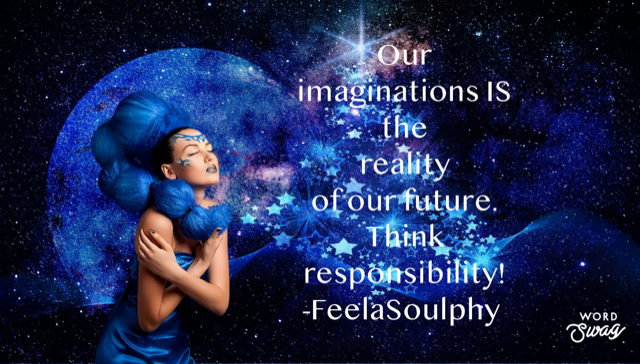
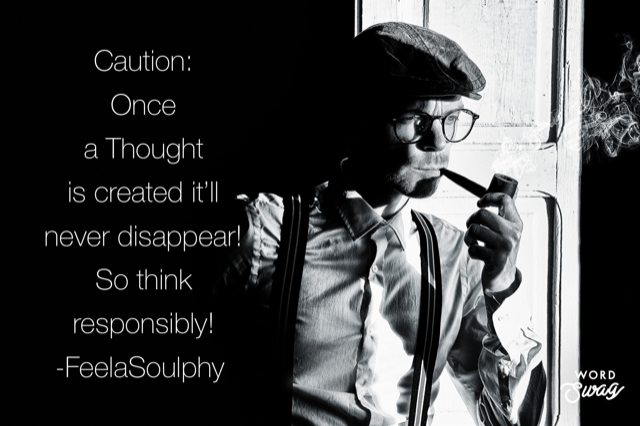

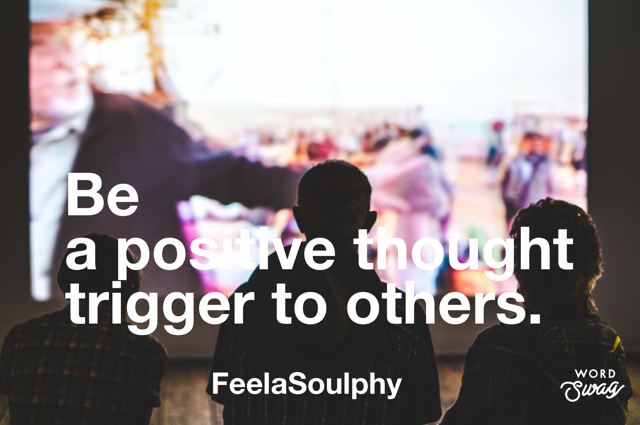
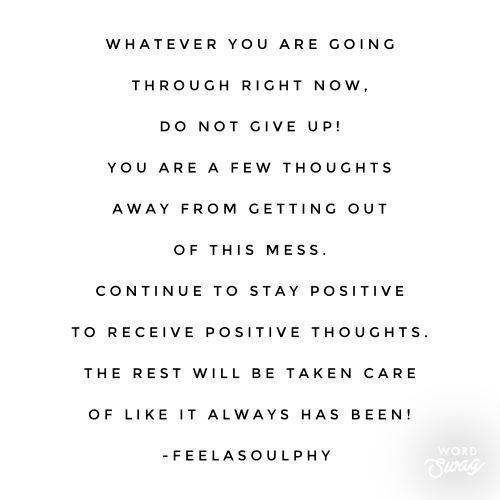
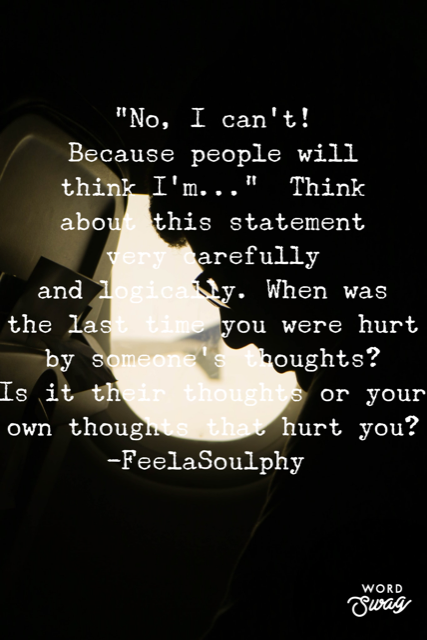
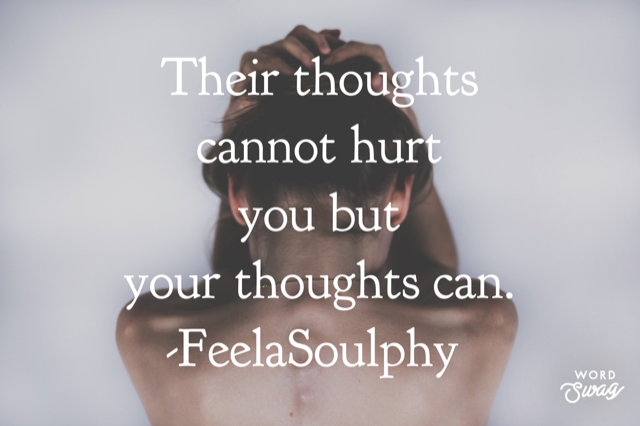
 RSS Feed
RSS Feed